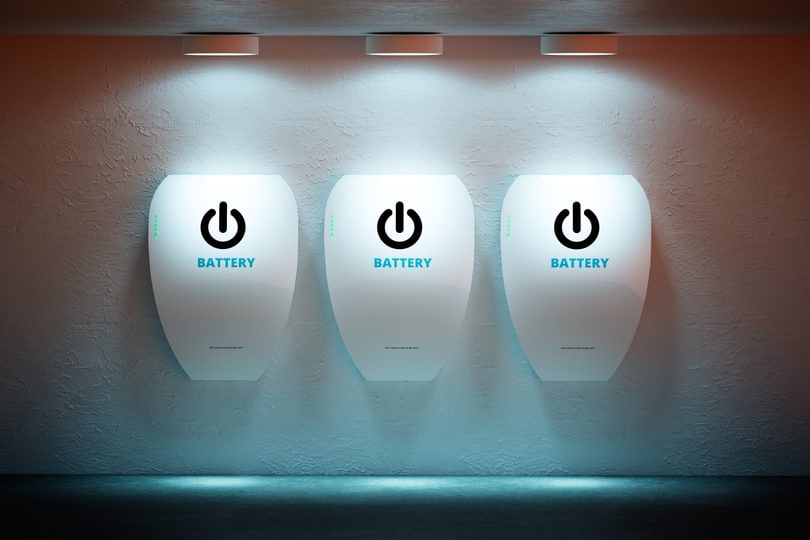
With wind and solar now making more electricity than nuclear for the first time in the UK, consumers are being drawn more to these technologies as their cost continues to be driven down. My recent research with Jacquelyn Pless and Sarah Darby has focused on improving our understanding of how much roof-top solar panels can reduce household electricity bills by analysing one-minute electricity monitoring data for 302 households that participated in a UK smart grid demonstration project. Not only are these technologies increasingly affordable, the benefit of installing them will only increase in time if retail electricity prices continue to rise.
Until now battery storage has not been given the same profile as solar and wind technologies. But this is beginning to change – particularly at the domestic level.
What are home batteries?
Home batteries are like the types of batteries people already have around their homes, like those that power laptops and mobile phones. The main difference is that home batteries are hundreds of times larger, fixed to a wall, and built to provide power to the whole home rather than just a laptop.
Consumers are now looking to home batteries because economically they are starting to make sense, and they can be used alongside solar provision. Cost reductions in solar power mean that it is increasingly affordable to install solar panels on your roof. This can provide a source of cheap electricity during the day. The problem is that many households are not able to make full use of the electricity their solar panels produce, they might be out at work during the day and end up exporting much of what they generate. Indeed our recent research shows that on average households with solar panels in the UK export 55% of what they generate throughout the year.
With a home battery system, instead of exporting all that cheap solar power during the day, consumers can use it instead to charge their battery, and then discharge the battery in the evening to offset the electricity that would otherwise be imported from the grid. The reason users might want to do this is because, in the UK at least, energy suppliers will only pay about 5p/kWh for what consumers export, yet charge consumers around 15p/kWh for anything they import.
This is all about trading cheap exported electricity during the day for expensive imported electricity in the evening. This price differential is what is creating the economic incentive for home batteries at present.
In the UK at least, ever since the government introduced the feed-in tariff back in 2010, households with solar panels have always been incentivised to trade exports for imports, such as by running a washing machine during the day instead of in the evening. It’s only recently however that it has started to make financial sense to think about trading exports for imports using a battery. This is because the rapid growth in electric vehicles is driving down the costs of batteries and owners are able use the same type of battery to power both their home and car!
Do home batteries make economic sense?
From a pure economic perspective, it is still early days for home batteries but there are a number of things happening that are making the economics increasingly favourable.
First, costs continue to come down, and home battery units are becoming more and more affordable.
In addition, as smart meters get rolled out, then people will have the option of moving onto more cost-reflective electricity tariffs, where the price of electricity could be relatively high during the evening ‘peak’ (when everyone else also wants to use electricity), and it will make more sense to use a battery to avoid paying for expensive peak electricity.
Whether buying a home battery makes economic sense will vary from case to case, and will depend on the size of the home’s PV system, how much power is being exported to the grid, how much is already being used within the home, the electricity tariff, and of course the cost of the actual battery installation. More work still needs to be done by industry to provide consumers with clear, standardised information to help make these decisions.
Going off-grid
Installing PV and batteries is not just an economic decision. Often people installing these technologies are interested in using ‘their own’ electricity, of becoming more self-sufficient, and becoming more independent of the grid. These technologies can potentially increase people’s awareness of their energy usage and help people become more engaged with the challenges of the wider energy system. If we are serious about reducing emissions from the power sector, then it is not just a question of decarbonising the supply of electricity, but also about changing how, why and when we consume it.
Solar photovoltaic self-consumption in the UK residential sector: New estimates from a smart grid demonstration project, Eoghan McKenna , Jacquelyn Pless and Sarah J.Darby. Energy Policy, Volume 118, July 2018.
Eoghan McKenna, was previously Postdoctoral Researcher at the Environmental Change Institute and Oxford Martin Fellow of the Oxford Martin Programme on Integrating Renewable Energy, and is now Senior Research Associate at UCL Energy Institute.
This opinion piece reflects the views of the author, and does not necessarily reflect the position of the Oxford Martin School or the University of Oxford. Any errors or omissions are those of the author.
